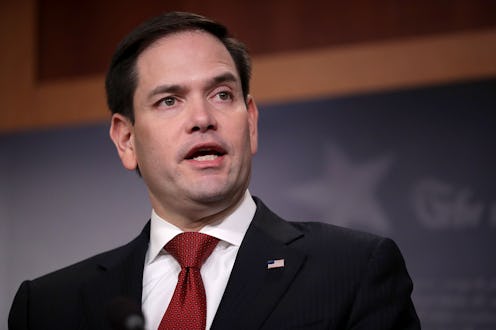News
Here’s What’s In The Ivanka-Backed Paid Family Leave Plan That’s About To Drop

Both Democrats and Republicans have been pushing to pass various paid family leave plans. This week, Republican Sen. Marco Rubio is revealing his paid family leave proposal, which would allow parents to pull funding from their future Social Security benefits, whether they’re working or not.
The Florida senator and a Republican representative, Ann Wagner of Missouri, co-wrote an op-ed in USA Today published on Wednesday that outlined the gist of the paid family leave legislation that they’ll introduce together.
The politicians said in the op-ed that the plan will benefit the working class by giving parents an option to receive monthly payments that can be applied to expenses such as rent, groceries, or new baby supplies. That funding will come from their future Social Security benefits. This basically means that parents can choose to take money that would have been set aside for their retirement and use it sooner rather than later. The to-be-proposed legislation is called the The Economic Security for New Parents Act.
This legislative move stemmed from an idea backed by Ivanka Trump, The Tampa Bay Times reported. The concept had also been promoted by the Independent Women’s Forum, which wants parents to defer Social Security retirement benefits by six weeks in order to extend every parent 12 weeks of paid leave.
With all that said, Democrats and some advocacy groups aren’t thrilled about the idea. The group Social Security Works tweeted in opposition to the plan, saying, “#RealPaidLeave doesn't force families to choose between financial security now and retirement security later.”
In their USA Today op-ed, Rubio and Wagner noted that rates of marriage and childbirth are falling. They argued part of the reason for that is the lack of stable employment and the scarcity of paid family leave programs. They sited a Congressional Research Service study that said just over one in 10 workers receives paid family leave from their employer.
They laid out the expected benefits of the paid family leave plan, noting that it would be beneficial for both working and stay-at-home parents:
“Parents taking the option would receive monthly payments that will help cover costs like rent, groceries and new baby supplies during a time of significant income constraints. The benefit will also be transferable between parents in the household. And unlike other paid parental leave proposals, this option would be available to working and stay-at-home moms and dads alike.”
But plenty of people aren’t buying what the two politicians are selling.
In a statement to the Tampa Bay Times, The National Partnership for Women & Families said:
“We appreciate that Sen. Rubio and Rep. Wagner are looking for a way to provide the paid leave America's families urgently need, but a program that only covers parents caring for new children, provides no leave for family care and personal medical needs, and forces parents to choose between paid leave and retirement security is absolutely the wrong way to go."
Democrats have been working on this issue in their own ways for years. For example, New York Sen. Kirsten Gillibrand first introduced the FAMILY Act— which would aim to create a universal family and medical leave insurance program — in 2013. Her plan would compensate workers for 66 percent of their earnings for up to six weeks, and the funding would come from a shared employer and employee payroll tax of 0.4 percent, according to The Los Angeles Times.
Rubio and Wagner ended their op-ed with a quote from President Franklin Delano Roosevelt, who signed the Social Security Act back in 1935:
“The civilization of the past hundred years, with its startling industrial changes, has tended more and more to make life insecure … we have tried to frame a law which will give some measure of protection to the average citizen and to his family.”
Who knows what FDR would say about these new plans, but as more politicians bring forward ideas about how to deal with the issue of paid family leave, settling on one solution may not be a simple task for Congress.